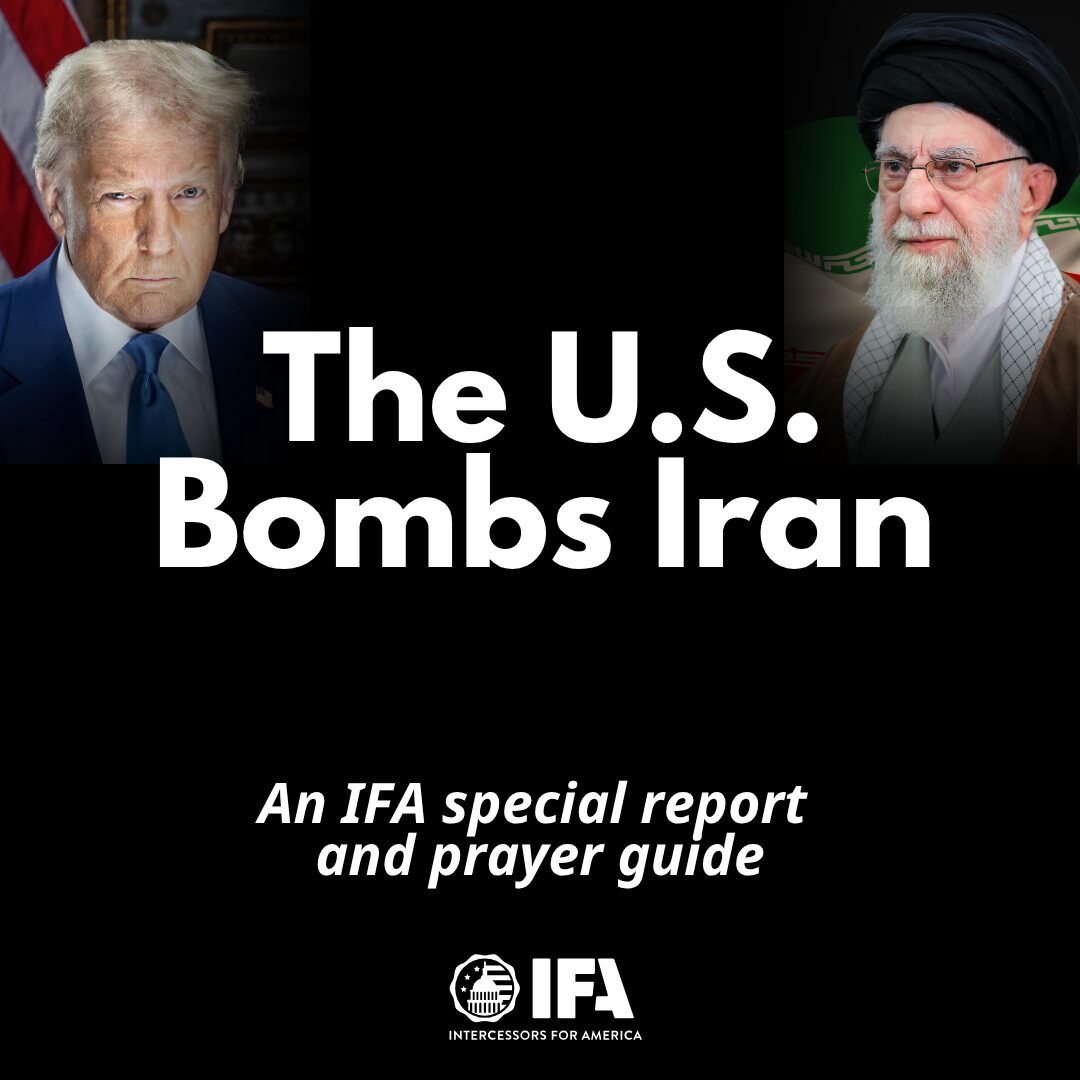Space War Worries: Real Risks Inbound
School Board Rejects ‘LGBTQ History Month’
Praise! Progress with Religious Exemptions in the Military
The Dangers of Digital IDs
Newsom Launches Abortion Site
Space War Worries: Real Risks Inbound
Analysis. We do not see satellites, but they are all around us. We use them every day, and their numbers are growing swiftly. How do we keep from blowing them up and causing a dangerous mess (dangerous in more ways than one)?
Get prayer updates from IFA.
Finding an answer to that question is the goal of a United Nations working group that met in Geneva, Switzerland, this week. And this is a conversation in which more and more leaders across the planet have a stake.
Space may be “the final frontier” (thank you, Star Trek), but some areas of outer space — especially those immediately surrounding Earth — are actually becoming relatively congested. As of January, there were reportedly more than 4,500 operational satellites circling the planet, and the vast majority of them were in low Earth orbit, an altitude of roughly 1,200 miles or less. This is the region in which the International Space Station circles our planet, and for which NASA indicates that there are other platforms in the works. It’s also a place that such companies as Amazon, Boeing, and Intelsat are actively pursuing with plans for tens of thousands more satellites.
That last point underscores just how important this realm of satellites is for contemporary culture. When we think of satellites, our minds may go immediately to those circling structures that the military and intelligence agencies use for photos or communication. We might also think of the weather-tracking satellites that the National Oceanic and Atmospheric Administration and other civilian agencies employ. But there is a lot more going on in that area of space.
In researching this article, I came across an interesting piece from the Canadian Space Agency, titled 10 Ways That Satellites Helped You Today. Some of the suggested ways were those one might consider high-level science: ways of helping farmers monitor the health of their crops, or of gathering information about greenhouse gases. But when it comes to reliance on satellites, we have daily habits to which we probably give little thought. For example, if I’m tracking my wife’s plane flight to see when she’ll be arriving at our local airport, I’ve just used a satellite. Then, when I turn to my smartphone’s Maps or Weather apps for help in planning how to get her the rest of the way home, I’ve probably relied on another satellite or two. Have I paid for parking using a bank card and then sat and watched a TV program at an airport café while waiting? Again, satellites are likely in the mix.
These are just a few examples of many common ways we frequently rely on satellites. And when I say “we,” I don’t mean Americans only. Individuals around the world rely on such conveniences. And they are not served exclusively by means of American-made satellites. The U.S. and Russia were the earliest to go into space decades ago, but others have now entered this arena. China and India are major players too, and the share of satellites being launched by dozens of other nations has grown significantly in the past five years.
All this brings us back to the aforementioned UN working group. It shouldn’t surprise us that with satellites being relied on for purely military and for potential soft power purposes alike, earthly adversaries are interested in methods for knocking each other’s equipment out of commission. Just last month the U.S. Department of Defense issued an updated directive recognizing space “as a priority domain of national military power,” and the agency promises to “protect and defend the use of space for U.S. national security purposes, the U.S. economy, and allies and partners of the United States.”
Experts concur. “Today, a number of countries are developing counterspace and anti-satellite weapons which are capable of deceiving, disrupting, denying, degrading, or even destroying objects in space,” said Victoria Samson, Washington office director for the Secure World Foundation, at the UN gathering. “The incentive to develop, and potentially use, these weapons stems from the growing role that space capabilities play today in every modern military force, particularly those of the major nuclear powers. Disrupting an opponent’s space capabilities might be considered in a military setting, but it could also lead to nuclear escalation and create long-term risks even after the war ends.”
Those long-term risks from a space war are sobering. Last year Chris Kubasik, CEO of tech and defense company L3Harris, called such a war “the biggest threat facing our nation.” As reported in SpaceNews, Kubasik told his audience at a space symposium: “If you think of the impact of a war in space and how it impacts something as simple as our cellphones, navigation, supply chain, logistics, healthcare. I think it is a serious issue.”
Among the concerns from such satellite-based conflicts are the types of battle that could be waged. Nations could try to use lasers or other means to blind or incapacitate a rival’s satellite, which may generate escalation risks. But even more dangerous could be the use of kinetic methods to knock satellites out of commission. Beyond the immediate conflict, in such cases a longer-term problem would be the resultant debris. Space junk, including millions of small specks of debris left over from old satellites or rockets, can be dangerous to active satellites as well as to manned spaceflights, given the high speeds at which that material continues to circle the earth.
“While no country has ever attacked another country’s space object in this way, the mere testing of destructive [anti-satellite] weapons represents some of the most significant debris-generating events in history that are creating problems for operational satellites today,” said Samson at the UN event.
The kinetic method of attacking satellites has raised enough concerns that the Biden administration swore off the tactic earlier this year and has been urging other nations to follow suit. During this week’s UN gathering, Japan and Germany made similar commitments, joining Canada, New Zealand, and the U.S.
Whether it involves agreements on satellite warfare or the advancing of space traffic management rules (like this initiative of the Trump administration), norms for the use of space around Earth will need to be hashed out and agreed to in the years ahead.
Will you pray for our leaders and those of other nations to have the wisdom to get this right?
Aaron Mercer is a contributing writer with two decades of experience in the Washington, D.C., public policy arena. Photo Credit: SpaceX on Unsplash.
Partner with Us
Intercessors for America is the trusted resource for millions of people across the United States committed to praying for our nation. If you have benefited from IFA's resources and community, please consider joining us as a monthly support partner. As a 501(c)3 organization, it's through your support that all this possible.


We use cookies to ensure that we give you the best experience on our website. If you continue to use this site we will assume that you are happy with it. Privacy Policy





Comments
Father, in the name of Jesus, the earth is yours and the fullness thereof, give these leaders, researchers, and decision makers YOUR wisdom and will regarding this situation that they may choose wisely and follow YOUR will and plans for space, not the will and plans of billionaires. Our oceans and lakes are polluted due to tge elite’s plans and industries now space is their target. Thank you for protecting your planet since the world began, thank you for protecting us, our homes, and our families, We trust you to hear and answer our prayers swiftly and thank you for it.
Glory! This RN has been praying for our leaders to be wiser with regard to all things digital, which totally depends on satellites! And not just our leaders here in the US Lord, but all over the world. All leaders, even the ones without titles, the influencers, in every walk of life that touches satellites, especially military Lord! Give them wisdom tempered not by fear or power but Your authentic love, that values life! Keep them asking ‘should we?’ Before going to ‘could we?’ And Poppa give them all a holy fear of You, to KNOW they will every one stand before You to give account of how they used the authority, power and trust of the people YOU have entrusted them with!
Thank You Jesus for bringing this important prayer need to the attention of a united, hopefully ever growing group Lord!
Dear Gracious God, I come before you in prayer that you guide ALL, who are sending satellites in our space above our planet. Please keep the good intentions in their hearts. Let the evil disappear into nothingness. In the Holy name of Jesus Christ, our Lord and Savior, Amen